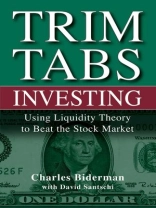Whether you are an investment professional managing billions of
dollars or an individual investor with a small nest egg,
Trim Tabs Investing shows you how to beat the major stock
market averages with less risk. This groundbreaking book
begins by comparing the stock market to a casino in which the house
(public companies and the insiders who run them) buys and sells
shares with the players (institutional and individual
investors). Trim Tabs Investing argues that stock
prices are primarily a function of liquidity–the amount of
shares available for purchase and the amount of money available to
buy them–rather than fundamental value. Finally, it
outlines the building blocks of liquidity theory and explains how
you can use them to predict the direction of the stock market.
‘Charles Biderman, a savvy and battle-scarred veteran of
the investment wars, has fashioned an intriguing approach to making
money in the stock market that adroitly avoids both heavy-breathing
speculation and the standard Wall Street practices that enable
investors, big and small, to lose money in good markets as well as
bad. Aimed at the sophisticated investor (which may or may not be
an oxymoron), the book is written in blessedly straightforward
prose and is a worthwhile read for anyone with an urge to have a
fling at investing.–Alan Abelson
Barron’s
‘Since the days of Joseph and Pharaoh, it has been
axiomatic that the size of the grain harvest affects the level of
grain prices; but today’s investors have been slow to
appreciate the fact that the supply of stock shares significantly
determines the level of stock prices. Biderman’s long overdue
book outlines the theory and evidence behind ‘Trading
Float, ‘ the actual–and exploitable–power behind
major moves in the stock market. –Paul Montgomery
CEO and CIO of Montgomery Capital Management
”Trade as corporate execs do, not as they
say.’ Charles Biderman has built an impressive list of hedge
fund clients from this essential insight, and this book does a
great job explaining exactly how retail investors can incorporate
it into their investing.’ –Eric Zitzewitz
Assistant Professor of Economics, Stanford Graduate School of
Business
‘Charles Biderman is a smart thinker, clear
writer–and he offers here some very interesting ideas. This
book is for the little guy who enjoys reading about money and
economics, even if he doesn’t adopt the strategies offered
here; and for the professional or sophisticated investor, who, to a
greater or lesser degree, just might.–Andrew Tobias
author of The Only Investment Guide You’ll Ever Need
สารบัญ
Acknowledgment.
Introduction.
PART ONE: INTRODUCING LIQUIDITY THEORY.
Chapter 1. A Tale of Fortune Lost.
Chapter 2. The Genesis of Liquidity Theory.
Chapter 3. The Principles of Liquidity Theory.
Chapter 4. The Building Blocks of Liquidity Analysis.
PART TWO: INSIDE LIQUIDITY THEORY.
Chapter 5. Demolishing the Cult of Earnings.
Chapter 6. The House: Secret Corporate Power.
Chapter 7. The Players: Buying, Selling, and Borrowing.
PART THREE: LOOKING BACK.
Chapter 8. The Bull Market and the Bubble.
Chapter 9. The Aftermath.
PART FOUR: Liquidity Theory in Action.
Chapter 10. Swinging for Singles: Lower-Risk Strategies.
Chapter 11. Swinging for the Fences: More Aggressive
Strategies.
PART FIVE: LOOKING AHEAD.
Chapter 12. Managing Difficulties.
Chapter 13. New Applications.
Chapter 14. How Liquidity Could Save the Markets.
Appendix: Historical Liquidity Data.
About the Authors.
Index.
เกี่ยวกับผู้แต่ง
CHARLES BIDERMAN is the founder and President of Trim Tabs
Investment Research. Born in New York City, he earned a BA from
Brooklyn College and an MBA from Harvard Business School. He began
his career as Alan Abelson’s assistant at Barron’s from 1971 to
1973. After correctly predicting the collapse of real estate
investment trusts, he became a successful real estate entrepreneur.
He founded Trim Tabs in 1990 to provide portfolio managers and
market strategists with unique investment insights. He is
frequently quoted in the financial media, including the Wall Street
Journal, Barron’s, CNBC, and Bloomberg.
DAVID SANTSCHI is an editorial consultant and copy editor with
Trim Tabs Investment Research. Born in Cincinnati, he earned an AB
in history magna cum laude from Davidson College and an MA in
history from the University of Wisconsin-Madison. Currently,
he is a doctoral candidate in early modern European history at the
University of Wisconsin-Madison.
For more information, please visit: www.Trim Tabs.com












